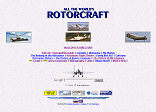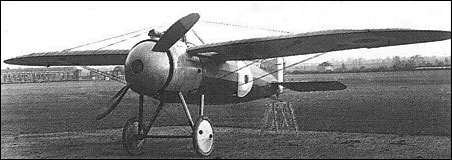|
| The M.1C was the production derivative of the private-venture
M.1A which, designed by Frank Barnwell, had
flown for the first time on 14 July 1916. It was of innovatory
design in being a shoulder-wing monoplane with a fully faired fuselage of good streamline form and
a drag-reducing hemispherical spinner. Four similar
aircraft were ordered by the War Office, these each
having a single 7.7mm Vickers gun mounted
on the port wing root and a clear-view cut-out panel in
the starboard wing root to afford the pilot a measure of
downward visibility. This version received the designation
M.1B and a production order for 125 aircraft was
placed on 3 August 1917 as M.1s. Powered by a 110hp
Le Rhone 9J nine-cylinder rotary engine, the M.1C had
a centrally-mounted Vickers gun, but its subsequent
operational career was largely confined to the Middle
East where 33 M.1Cs were sent during 1917-18. No aircraft
of this type were issued to RFC squadrons based
in France, most being used by UK-based training units,
the 97km/h landing speed being considered
too high for small Western Front airfields.
 | A three-view drawing (1280 x 928) |
| WEIGHTS |
| Take-off weight | 611 kg | 1347 lb |
| Empty weight | 406 kg | 895 lb |
| DIMENSIONS |
| Wingspan | 9.37 m | 31 ft 9 in |
| Length | 6.23 m | 20 ft 5 in |
| Height | 2.37 m | 8 ft 9 in |
| Wing area | 13.47 m2 | 144.99 sq ft |
| PERFORMANCE |
| Max. speed | 209 km/h | 130 mph |
| Brian Howard, e-mail, 29.04.2011 10:32 I have searched several years for a set of plans to produce a full scale version of this wonderful plane. Any help in steering me in the right direction would be greatly appreciated. reply | | Klaatu, e-mail, 03.04.2011 16:17 By all accounts this was one of the best fighters of it's day. It's sole operational weakness was a limited downward view, which was addressed by leaving openings in the skin at the wing roots. nevertheless, this fighter was relegated to obscurity due entirely to the RFC's misplaced prejudice against monoplanes. reply | | trevor grace, e-mail, 19.10.2010 19:19 I have seen plans of the balsa usa m1c and all of the
fuse longerons were half a space out, i.e the first one
was centre top !!!
the fuel filler is centre top with the longerons starting
either side
e reply | | stephen baldock, e-mail, 13.05.2010 09:55 I scratch build build ww1 model planes 1 /4 scale etc.
would love to find a plan of bristol mc1 monoplane
if any one can help.. thanks Stephenreply | |
| | Daniel Reveco Valenzuela, e-mail, 01.09.2010 20:13 Also Chile received the M1C in 1918. Lt.Dagoberto Godoy crosse3d the Andes range, first time Dic.12.1918 in a Bristol M1C (more than 16000 ft) from Santiago to Mendoza
Argentina. I flew an exact replica, built with original plans and materials, equiped with a Warner engine in 1989.
inh 1989 reply | | JIm Crawford, e-mail, 09.01.2010 07:59 John Heinz, Have you noticed that there is a fine scale model of the M1 sold by Balsa USA? I must say that you shall run into a terrible problem finding a suitable spinner, for there are none available. My model has a custom made spinner and it does look like the original plane. I put a Pilot leaning over to sight the gun with one eye, for I am against the average stiff-looking pilots available. The plane flies well enough and I have seen them with fairly large engines installed. I four-stroke sounds good, my diesel sounds better although it needs a non-scale exhaust extension. The plane could easily be scaled-up to any size you desire, but I will bet that you go absolutely nuts trying to fine a suitable spinner, a main feature of the airplane. Good luck........ (Yes, I am a retired SAC B36 /B52 gunner as my E-mail address shows...) reply | | john heinz, e-mail, 08.07.2007 04:36 There was a version used by a New Zealand ace that had less fairing--and was red in color. Plans were published in, I think, MODEL AIRPLANE NEWS, about the 1980's, for a flying model. I am seeking plans for a scale model
Your data is very helpful. reply |
|
Do you have any comments?
|
| 
COMPANY
PROFILE
All the World's Rotorcraft
|







